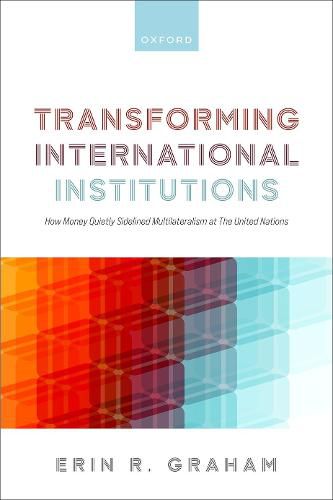Readings Newsletter
Become a Readings Member to make your shopping experience even easier.
Sign in or sign up for free!
You’re not far away from qualifying for FREE standard shipping within Australia
You’ve qualified for FREE standard shipping within Australia
The cart is loading…






Transforming International Institutions illuminates how a slow, quiet, subterranean process can produce big, radical change in international institutions and organizations. Drawing on historical institutionalism and interpretive tools of international law, Graham provides a novel theory of uncoordinated change over time. It highlights how early participants in a process who do not foresee the transformative potential of their acts, but nonetheless enable subsequent actors to push change in new directions to profound effect. Graham deploys this to explain how changes in UN funding rules in the 1940s and 1960sEDperceived as small and made to solve immediate political disagreementsEDultimately sidelined multilateral governance at the United Nations in the twenty-first century. The perception of funding rules as marginal to fundamental principles of governance, and the friendly orientation of change-initiators toward the UN, enabled this quiet transformation. Challenging the UN's reputation for rigidity and its status as a bastion of egalitarian multilateralism, Transforming International Institutions demonstrates that the UN system is susceptible to subtle change processes and that its egalitarian multilateralism governs only a fraction of the UN's operational work.
$9.00 standard shipping within Australia
FREE standard shipping within Australia for orders over $100.00
Express & International shipping calculated at checkout
Transforming International Institutions illuminates how a slow, quiet, subterranean process can produce big, radical change in international institutions and organizations. Drawing on historical institutionalism and interpretive tools of international law, Graham provides a novel theory of uncoordinated change over time. It highlights how early participants in a process who do not foresee the transformative potential of their acts, but nonetheless enable subsequent actors to push change in new directions to profound effect. Graham deploys this to explain how changes in UN funding rules in the 1940s and 1960sEDperceived as small and made to solve immediate political disagreementsEDultimately sidelined multilateral governance at the United Nations in the twenty-first century. The perception of funding rules as marginal to fundamental principles of governance, and the friendly orientation of change-initiators toward the UN, enabled this quiet transformation. Challenging the UN's reputation for rigidity and its status as a bastion of egalitarian multilateralism, Transforming International Institutions demonstrates that the UN system is susceptible to subtle change processes and that its egalitarian multilateralism governs only a fraction of the UN's operational work.